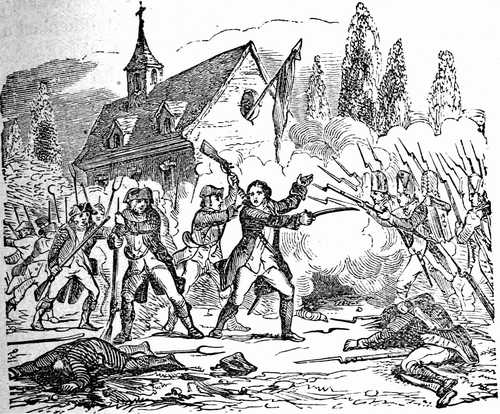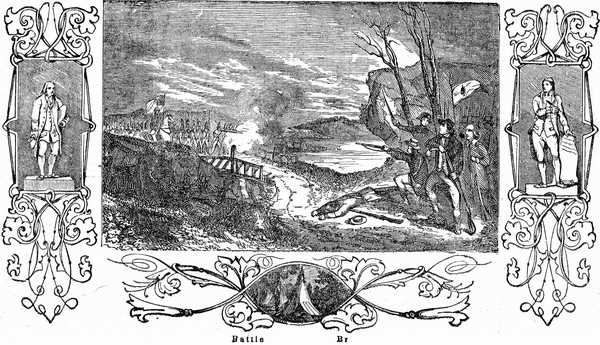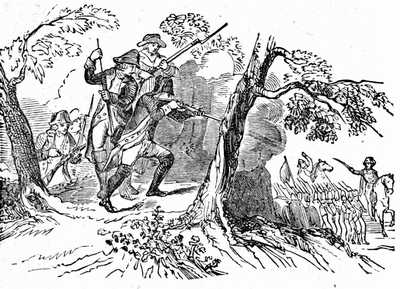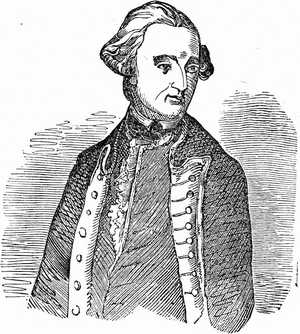Thrilling Incidents In American History
• Preface
Revolutionary War
• Opening Of The Revolution
• The Boston Massacre
• Affair of the Sloop Liberty
• Affair of the Gaspee
• The Tea Riot
• The Boston Port Bill
• The First Continental Congress-Consequent Parliamentary proceedings
• Organization of the Minute-Men
• Patrick Henry-Second Provincial Congress-First Military Enterprise
• Battles of Lexington and Concord
• Battle of Bunker's Hill
• Capture of Ticonderoga
• Second Continental Congress-Washington's Appointment
• Siege of Boston
• Incidents at the Evacuation of Boston
• Burning of Falmouth
• Arnold's Expedition to Quebec
• Siege of Quebec, and Death of Montgomery
• Scenes at Quebec during the Siege
• Expedition against Charleston
• The Declaration of Independence
• The Battle of Long Island
• Washington's Retreat through New Jersey-Capture of General Lee
• Battle of Trenton
• Battle of Princeton
• Capture of General Prescott
• Battle of Brandywine
• Battle of Germantown
• Battle of Red-Bank
• Attack on Fort Mifflin-Retirement of the Army to Valley Forge
• Battle of Bennington
• Murder of Miss M'Crea
• Battle of Stillwater
• Battle of Bemis' Heights, and Retreat of Burgoyne
• Capture of Forts Clinton and Montgomery
• Surrender of Burgoyne
• The Treaty with France
• Attack on Savannah, and Death of Pulaski
• Storming of Stony Point
• General Sullivan's Campaign against the Mohawks
• Tarleton's Quarters
• Battle of Camden, and Death of De Kalb
• Arnold's Treason
• The Loss of the Randolph
• The British Prison-Ships
• Capture of the Serapis
• Putnam's Feat at Horseneck
• Battle of Eutaw Springs
• Wayne's Charge at Green Spring
• Capture of the General Monk
• The Mutinies
• Battle of the Cowpens
• Capture of New London
• Massacre of Wyoming
• Surrender of Cornwallis
War With France
• Capture of L'Insurgente
• The Constellation and Vengeance
War With Tripoli
• Burning of the Philadelphia
• Bombardment of Tripoli
• Loss of the Intrepid
• Expedition of General Eaton
Second War With England
• Battle of Tippecanoe
• Capture of the Guerriere
• Tragical Affair of an Indian Chief
• Battle and Massacre at the River Raisin
• Captain Holmes's Expedition
• Capture of the Caledonia and Detroit
• The Wasp and Frolic
• Gallant Conduct of Lieutenant Allen at the Capture of the Macedonian
• Capture and Destruction of the Java
• Siege of Fort Meigs
• Capture of York, and Death of General Pike
• Defence of Sackett's Harbour
• Defence of Fort Stephenson
• Battle of Lake Erie
• Battle of the Thames
• Gallant Action of Commodore Chauncey under the guns of Kingston Citadel
• The Sacking of Hampton
• Capture of the Peacock
• Massacre at Fort Mimms
• Surrender of Weatherford
• Battle of Niagara
• BattIe of New Orleans
War With Mexico
• Battle of Palo Alto
• Battle of Resaca de la Palma
• Capture of Monterey
• Battle in the Streets of Monterey
• Thrilling Scenes in the Battle of Buena Vista
• Bombardment of Vera Cruz
• Battle of Cerro Gordo
• Battles of Contreras and Churubusco
• Storming of Chapultepec


BATTLES OF LEXINGTON AND CONCORD.
 CONSIDERABLE quantity of military stores having been deposited at Concord,
an inland town, about eighteen miles from Boston, General Gage purposed
to destroy them. For the execution of this design, he, on the night
preceding the 19th of April, detached Lieutenant-Colonel Smith and Major
Pitcairn, with eight hundred grenadiers and light infantry; who, at eleven
o'clock, embarked in boats at the bottom of the
common in Boston, crossed the river Charles, and, landing at Phipps's farm in
Cambridge, commenced a silent and expeditious march for Concord.
CONSIDERABLE quantity of military stores having been deposited at Concord,
an inland town, about eighteen miles from Boston, General Gage purposed
to destroy them. For the execution of this design, he, on the night
preceding the 19th of April, detached Lieutenant-Colonel Smith and Major
Pitcairn, with eight hundred grenadiers and light infantry; who, at eleven
o'clock, embarked in boats at the bottom of the
common in Boston, crossed the river Charles, and, landing at Phipps's farm in
Cambridge, commenced a silent and expeditious march for Concord.
Although several British officers, who dined at Cambridge the preceding day, had taken the precaution to disperse themselves along the road leading to Concord, to intercept any expresses that might be sent, from Boston to alarm the country; yet messengers, who had been sent from town for that purpose, had eluded the British patrols, and given an alarm, which was rapidly spread by church bells, signal guns, and volleys.
The march of the British was so cautious, that they remained undiscovered till within a mile and a half of Lexington meeting-house, and time was scarce left for the last messenger to return with the tidings of their approach.
| The new alarm is now given; the bell rings, alarm guns are fired, the drum beats to arms. Some of the militia had gone home, when dismissed; but the greater part were in the neighbouring bouses, arid instantly obeyed the summons. Sixty or seventy appeared on the green, and were drawn up in double ranks. At this moment the British column of eight hundred gleaming bayonets appears, headed by their mounted commanders, their banners flying and drums beating a charge. To engage them with a handfuJ of militia of course was madness,-to fly at the sight of them, they disdained. The British troops rush furiously on; their commanders, with mingled threats and execrations, bid the Americans lay down their arms and disperse, and their own troops to fire. |
A moment's delay, as of compunction, follows. The order with vehement imprecations is repeated, and they fire. Noone falls, and the band. of self- devoted heroes, most of whom had never seen such a body of troops before, stand firm in the front of an army, outnumbering them ten to one. Another volley succeeds; the killed and wounded drop, and it was not ti1l they had returned the fire of the overwhelming force, tliat the militia were driven from the field. A scattered fire now succeeded on both sides while tho Americans remained in sight'; and the British troops were then drawn up on the green, to fire a volley and give a shout in honour of the victory.
On arriving at Concord, it was the first care of the British commander to cut off the approach of the Americans from the neighbouring towns, by destroying or occupying the bridges.. A party was immediately sent to the south bridge amI tore it up. A force of six companies, under Captains Parsons and Lowric, was sent to the north bridge. Three companies under Captain Lowne were left to guard it, and three under Captain Parsons proceeded to Colonel Barrett's house, in search of provincial stores. While they were engaged on that errand, the militia of Concord, joined by their brave brethren from the neighbouring towns, gathered on the hill opposite the north bridge, under. the .command of Colonel Robinson and Major Buttnck. The British companies at the bridge were now apparently bewildered with the perils of their situation, and began to tear up the planks of the bridge; not remembering that this would expose their own party, then at Colonel Barrett's, to certain and entire destruction.
The Americans, on the other hand, resolved to keep open the communication with the town; and perceiving the attempt which was made to destroy the bridge, were immediately put in motion, with orders not ~o give the first fire. They draw near to the bridge, the Acton company in front, led on by the gallant Davis. Three alarm guns were fired into the water, by the British, without arresting the march of our citizens. The signal for a general discharge is then made ;-a British soldier steps from the ranks and fires at Major Buttrick. The ball passed between his arm and his side, and slightly wounded Mr. Luther Blanchard, who stooQ near him. A volley instantly followed, and Captain Davis was shot through the heart, gallantly marching at the head of the Acton militia against the choice troops of the British line. A private of his company, Mr. Hosmer, of Acton, also fe1l at his side.
A general action now ensued, which terminated in the retreat of the British party, after the loss of several kil1ed and wounded, toward the centre of the town, followed by the brave band who had driven them from their post. The advance party of British at Colonel Barrett's was thus left to its fate; and nothing would have been more easy th'an to effect its entire destruction. Belt the idea of a declared war had yet scarcely forced itself with all its consequences, into the minds of our countrymen; and these advanced companies were allowed to return unmolested to the main band.
It was now twelve hours since the first alarm had been given, the evening before, of the meditated expedition. The swift watches of that eventful night had scattered the tidings far and wide,; and widely as they spread, the people rose in their strength. The geniug of America, on this the morning of her emancipation, had sounded her horn over the plains and upon the mountains; and the indignant yeomanry of the land, . armed with the weapons which had done service in their fathers' hands, poured to the spot where this new and strange tragedy was acting. The old New England drums, that had beat at Louisbourg, at 'Quebec, _at Martinique, at the Havana, wese now sounding on II all the roads to Concord. There were officers in the British line that knew the sound; they had heard it, in the deadly breach, beneath the black. deep-throated engines of the French and Spanish castles.
With the British it was a question no longer of protracted hostility,Cnor even of halting long enough to rest their exhausted troops, after a weary night's march, and all the labour, confusion, and distress of the day's efforts. Their dead were hastily buried in the public square; their wounded placed in the vehicles which the town afforded; and a flight commenced, to which the annals of British warfare will hardly afford a parallel.

Battle of Concord Bridge
On all the neighbouring hills, were multitudes from the surrounding country, of the unarmed and infirm, of women and of children, who had fled from the terrors and the perils of the plunder and conflagration of their homes; or were collected, with fearful curiosity, to mark the progress of this storm of war. The panic fears of a calamitous flight, on the part of the British, transformed this inoffensive, timid throng into a threatening array of armed men; and there was too much reason for the misconception. Every height of ground, within reach of the line of march, was covered with the indignant avengers of their slaughtered brethren. The British light companies were sent out to great distances as flanking parties; but who was to flank the flankers? Every patch of trees, every rock, every stream of water, every building, every stone wall, was lined (I use the words of a British officer in the battle), was lined with an unintermitted fire.

Retreat from Concord
Before the flying troops had reached Lexington, their rout was entire. An English historian says, the British soldiers were driven before the Americans like sheep; till, by a last desperate effort, the officers succeeded in forcing their way to the front, "when they presented their swords against the breasts of their own men, and told them if they advanced they should die." Upon this, they began to form, under what the same British officer pronounces "a very heavy fire," which must soon have led to the destruction or capture of the whole corps.
At this critical moment, it pleased Providence that a reinforcement should arrive. Colonel Smith had sent back a messenger from Lexington, to apprise General Gage of the check he had there received, and of the alarm which was running through the country. Three regisments of infantry, and two divisions of marines, with two field-pieces, under the cdommand of Brigadier-General Lord Percy, were accordingly detached. The marched out of Boston, through Roxbury and Cambridge, and came up with the flying party, in the hour of their extreme peril. While their field-pieces kept the Americans at bay, the reinforcement drew up in a hollow square, int which, says the British historians, they received the exhausted fugitives, "who lay down on the ground, with their toungues hanging from their mouths, like dogs after a chase."
A half-hour was given to rest; the march was then resumed; and under cover of the field-pieces, every house in Lexington, and on the road downwards, was plundered and set on firel. Though the flames in most cases were speedily extinquished, several houses were destroyed. Notwithstanding the attention of a great part of the Americans was thus

Earl Percy.
drawn off, and although the British force was now more than doubled, their retreat still wore the aspect of a flight. The Americans filled the heights that oVE~rhur;g the road, and at every defile the struggle' was sharp and bloody. At \Vest Cambridge the \gallant Warren (never distant when danger was to be braved) appeared in the fiel,d, and a musket-balJ soon cut off a lock of hair from his temple. Gerreral Heath was with him, nor does there appea r till this moment to have been any effective command among the American forces.
Below West Cambridge, the militia from Dor- chester, Roxbury, and Brookline, came up. The British field-pieces began to lose their terror. A sharp skirmish followed, and many fell on both sides Indignation and outraged humanity struggled on the one hand, veteran discipline and desperation on the other; and the contest, in more than one instance, was man to man, and bayonet to bayonet.
The British officers had been compelled, to descend from their horses, to escape the certain de- struction which attended their exposed situation. The wounded, to the number of two hundred, no,,: presented the m~st distressing and constantly in- creasing obstruction to the progress of the march. Near one hundred brave men qad fallen in this dis- astrous flight;' a considera ble number had been made prisoners; a round or two of ammunition only re-' mained; and it was not till late in the evening, nearly twenty-four hours from the time when the'first de- tachment was put in motion, that the exhaust<:JG remnant reached the heights of Charlestown. The boats of the vessels-or-war were immediately employed to transport the wc:mnded'; the remaining British troops in Boston came over to Charlestown to pro- tect their weary countrymen during the night; and, before the close of the next day, the royal army waa fo:'mally besieged in Boston.
It was one of those great days, one of those elemental occasions in the world's affairs, when the people rise, and act for themselves. Some organization and preparation had been made; but, from the nature of the case, with scarce any effect on the events of that dav. It may be doubted whether there was an efficient order given the whole day, to any body of men as large as a regiment. It was the people, in their first capacity, as citizens and as freemen, starting from their beds at midnight, froll} their firesideB, and from their fields, to take their own cause into their own hands.
Such a spectacle is the height of the moral sublime; when the want of everything is fully made up by the spirit of the cause, and the soul within stands in place of discipline, organization, resources. In the prodigious efforts of a veteran army, beneath the dazzling splendour of their array, there is something revolting to the reflective mind. The ranks are filled with the desperate, the mercenary, the depraved; an iron slavery, by the name of subordination, merges the free will of one hundred thou saud men in tho unqualified despotism of one; the humanity, mercy, and remorse, which scarce ever deserts the individual bosom, are sounds without a meaning to that fearful, ravenous, irrational monster of prey, a mercenary army. It is hard to say who are most to be com- miserated, the wretched people on whom it is let loose, or the still more wretched people whose sub- stance has been sucked out to nourish it into strength and fury.
But, in the efforts of the people--of the people struggling for their rights, moving not in organIzed, disciplined masse:;1, but in their spontaneous action! man for man, and heart for he~rt,-though I like not war nor any of its works, there is something glorious. They can then move forward without orJers, act together without cornbination, and brave the flaming lines of battle without intrenchments to cover, or walls to shield them.
No dissolute camp has worn off from the feelings of the youthful soldier the freshness of that home where his mother and his sisters sit waiting, with tearful eyes and achi,ng hearts, to hear good news from the wars; no long service in the ranks of a . conqueror has turned the veteran's heart into marble; their valour springs not from recklessness, from habit, from indifference to the preservation of a life knit by nc pledges to the life of others. But in the strength and spirit of the cause alone they aCL, they contend, they bleed. In this, they conquer.
The people always conquer. They must always conquer. Armies may be'defeated; kings may be over- thrown, and new dynasties imposed by foreign arms on an ignorant and slavish race, that care not in what language the covenant of their subjection runs, nor in whose name the deed of their barter and sale is made out. But the people never invade; and, when they rise against the invader, are never subdued.
If they are driven from the plains, they fly to the mountains. Steep rocks and
everlasting hills are their castles; the tangled, pathless thicket, their
palisado; and Nature-God, is their ally. Now he overwhelms the hosts of their
enemies, beneath his drifting mountains of sand; now he buries them beneath
a
falling atmosphere of polar snows; he lets loose his tempests on their fleets;
he puts a folly into theIr counsels, a madness into the hearts of their leaders;
and never gave, and never will give, a full and final triumph over a virtuous,
gallant people, resolved to be free.